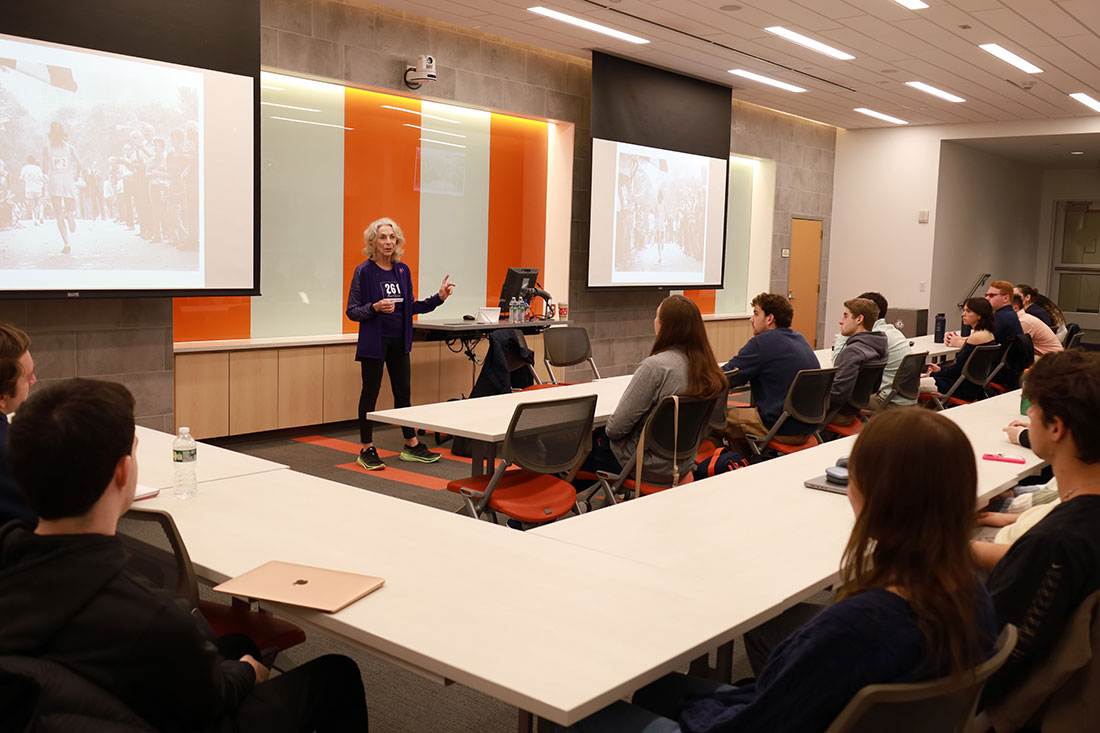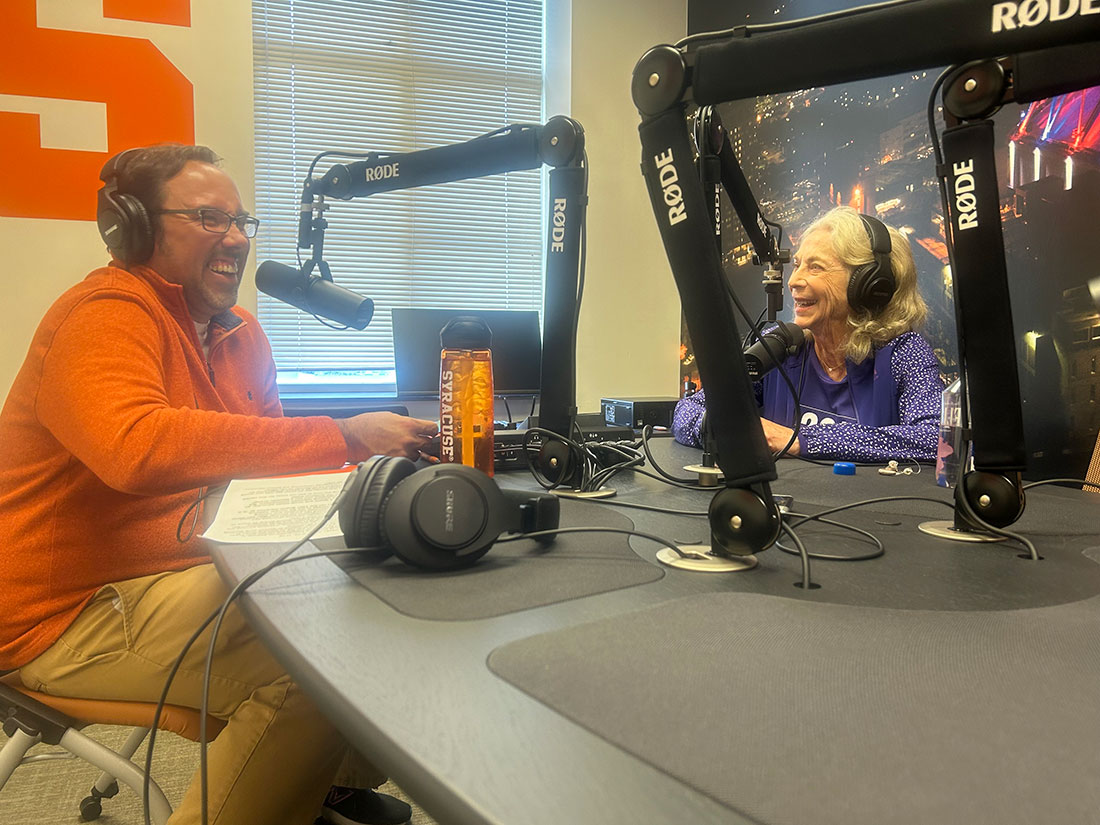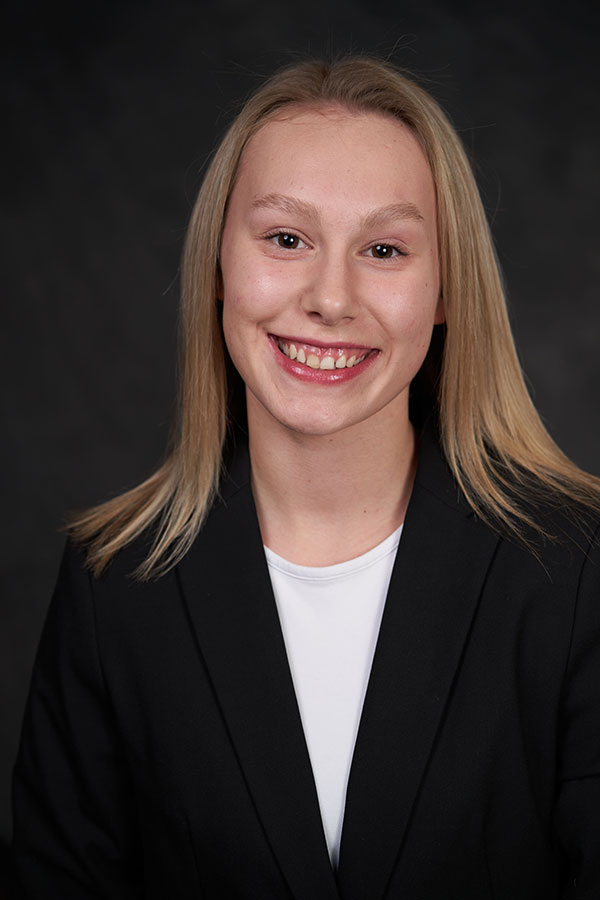
When Kathrine Switzer ’68, G’72 famously became the first woman to officially run in the Boston Marathon in 1967, women in the United States could not apply for, yet alone own, their own credit cards.
In fact, women weren’t allowed to own credit cards until 1974, when the Equal Credit Opportunity Act enabled women and minorities to obtain credit cards and loans. That was a critical time for women in America, and Switzer continued the athletic and social revolution she started in 1967 by winning the New York City Marathon in 1974.
“In the 2024 New York City Marathon (on Nov. 3), there will be 52,000 runners and 27,000 will be women, and you can bet that all 27,000 have their own credit cards and will spend millions of dollars in New York City,” Switzer told students during a recent visit to the Falk College of Sport and Human Dynamics.
Switzer, an emeritus member of the Falk College Department of Sport Management Advisory Council, visited Syracuse and Falk College Oct. 24 for a variety of reasons, including a discussion with Syracuse University Libraries’ Special Collections Research Center about creating a collection of Switzer’s artifacts related to her career and women in running. Switzer discusses this collection, her time at Syracuse, her Boston Marathon experience, and more in an entertaining ’Cuse Conversations podcast scheduled for early December.

At Falk, Switzer spent the afternoon speaking with students in the Sport Management “Race, Gender & Diversity in Sport Organizations” classes taught by Assistant Professor Lindsey Darvin. From breaking barriers in the Boston Marathon to becoming the driving force behind the inclusion of the women’s marathon in the Olympics starting in 1984, Switzer has been at the forefront of change in women’s sports, and she encouraged the students to “let your mind run wild” when thinking of the impact they can make.
“Look at the format of the (2024) Olympic Games in Paris and the events that took place there,” she said. “Whoever heard of half of these (sports), but they’re inspiring and viable. You have so many things you can get involved in and get creative with.
“Things may not be easy,” she added. “You’re going to hit a lot of brick walls, people may laugh at you, but stick with it, finish the job, and try to create something wonderful – and you will.”
Switzer has never stopped running – she is the first woman to run a marathon 50 years after her first one – and she has never stopped advocating for the inclusion of women in sports. In 2017, Switzer launched 261 Fearless as a global nonprofit organization to empower and unite women through the creation of local running clubs, educational programs, communication platforms, and social running events.
The number 261 is a nod to her bib number in the 1967 Boston Marathon that the race director tried to take from her. Switzer’s boyfriend, who was running along with her, pushed the director to the side and Switzer finished the race. Like Switzer on that day in Boston, 261 Fearless is focused on women’s empowerment and putting one foot in front of the other to finish the race.
“If you want to lift a woman up, show her how to run,” Switzer said. “We look at all the modern women out there running and there’s thousands and thousands of them, but there are also so many women across the world who are isolated or restricted by religious convention, or social convention, or social mores.”
Since its inception, 261 Fearless has trained and mentored over 500 coaches who have worked with nearly 7,000 women in 14 countries and five continents through education programs and women-only running clubs.
“After getting the women’s marathon in the Olympics Games, I thought that was great for women who can train and compete in a race but what about those women under a burqa Afghanistan or enslaved in their home with domestic abuse, how are we going to reach them?” Switzer said. “That’s what inspired us to create 261 Fearless.
“Suddenly, that old bib number became a number that meant fearless in the face of adversity,” she added. “From the worst things, come the best things. If something is wrong, there’s an opportunity to change it.”
At this year’s New York City Marathon – the 50th anniversary of Switzer’s win in the event – 261 Fearless created The Fearless 50, a team of 50 runners who are passionate about supporting women and understand the transformative power of running. As part of this initiative, The Fearless 50 is hosting a fundraising brunch on Nov. 2 and Falk College is a proud sponsor of that event where Switzer will be the featured speaker. The Falk College logo will also be featured on the bibs worn by The Fearless 50 runners.

“I was invited to attend all their weekend events, including a panel with Peloton, a panel with Kathrine Switzer, the brunch to commemorate the 50th anniversary of her victory at the New York City Marathon, and a cheer zone between Peloton and 261,” said Siket, who is a Falk College Peer Advisor and Ambassador and a member of the Charity Sports Auction team and the Sport Management and Women in Sports and Events (WISE) clubs.
“I am looking forward to marathon weekend as I will be able to interact with other volunteers, Kathrine Switzer, and others,’’ Siket said.
During the weekend, it’s likely that Switzer will at some point repeat the inspiring message that she gave to Falk College students during her visit when one asked about the best piece of advice Switzer had for them.
“Show up! Nothing happens when you stay at home,” Switzer told the students. “What’s out there may be scary, but you have to face it and that’s what opportunity is. When the world won’t give it you, you have to go out and get it.”
In 2018, Switzer delivered the commencement address at Syracuse University. To learn more about Switzer’s history and ongoing advocacy work, visit her marathonwoman.com website.
